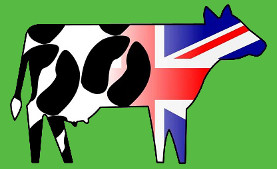By Nielsen, Birte L. and Pryce, Jennie E. and Simm, Geoff and Veerkamp, Roel F., Livestock Production Science, 1999
Description
The effects of feeding system, genotype and genotype by feeding system interactions on a range of health and fertility traits were investigated in Holstein Friesian cows at the Langhill Dairy Cattle Research Centre. There were two genetic groups: a selection (S) and control (C) line, housed and managed as one herd. Animals from each group were assigned to either a high concentrate (HC) or low concentrate (LC) feeding system and offered approximately 2500 kg and 1000 kg of concentrate per lactation on the HC and LC diets respectively. Feeding system had a significant effect on milk fever, days to first service and days to first heat. Lactation number had a significant effect (P < 0.05) on the incidence of mastitis, ketosis, retained placentas, milk fever and lameness and conception at first service. Effects of genotype were investigated first by comparing the two genetic groups and then by regressions of the health and fertility traits on pedigree index for fat plus protein (PI). Significant effects of PI were found for oestrus not observed, conception at first service, days to first heat, calving interval, days open and days to first service. The regression coefficient for mastitis on PI was also significantly different from zero (P < 0.05). There were no statistically significant genetic line by feeding system interactions, indicating that the observed line differences applied to both dietary treatments. Heritabilities for the health traits ranged between 0.00 and 0.08 and for the fertility traits they ranged between 0.02 and 0.15. Selection for high genetic merit in this herd, seems to have led to a deterioration in fertility but not health traits (with the exception of mastitis). These results, in line with those from studies in large populations, suggest that as genetic merit for production rises, fertility and some aspects of health are deteriorating
The effects of feeding system, genotype and genotype by feeding system interactions on a range of health and fertility traits were investigated in Holstein Friesian cows at the Langhill Dairy Cattle Research Centre. There were two genetic groups: a selection (S) and control (C) line, housed and managed as one herd. Animals from each group were assigned to either a high concentrate (HC) or low concentrate (LC) feeding system and offered approximately 2500 kg and 1000 kg of concentrate per lactation on the HC and LC diets respectively. Feeding system had a significant effect on milk fever, days to first service and days to first heat. Lactation number had a significant effect (P < 0.05) on the incidence of mastitis, ketosis, retained placentas, milk fever and lameness and conception at first service. Effects of genotype were investigated first by comparing the two genetic groups and then by regressions of the health and fertility traits on pedigree index for fat plus protein (PI). Significant effects of PI were found for oestrus not observed, conception at first service, days to first heat, calving interval, days open and days to first service. The regression coefficient for mastitis on PI was also significantly different from zero (P < 0.05). There were no statistically significant genetic line by feeding system interactions, indicating that the observed line differences applied to both dietary treatments. Heritabilities for the health traits ranged between 0.00 and 0.08 and for the fertility traits they ranged between 0.02 and 0.15. Selection for high genetic merit in this herd, seems to have led to a deterioration in fertility but not health traits (with the exception of mastitis). These results, in line with those from studies in large populations, suggest that as genetic merit for production rises, fertility and some aspects of health are deteriorating
We welcome and encourage discussion of our linked research papers. Registered users can post their comments here. New users' comments are moderated, so please allow a while for them to be published.
